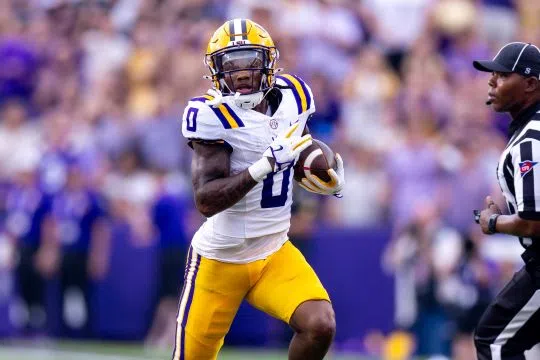By Hunt Palmer
College football staff size is limitless. How to optimize the performance of that staff is the battle every college football head coach fights.
Coaches can bring on as many analysts and support staff members as they please. A walk around the football operations building on a given day reveals dozens of staff members, both school aged and much older, grinding film and snacking on protein bars.
Still, only 10 staff members can be full-time assistants. Those 10 can be divided in any way.
In 2024, LSU did don’t employ a full-time special teams coach. Why? There wasn’t room.
Offensively, Joe Sloan called the plays and worked with the quarterbacks. Cortez Hankton co-coordinated the offense and handled wide receivers. Slade Nagle coached the tight ends. Brad Davis managed the offensive line, and Frank Wilson headed up the running backs. Five coaches.
Defensively, Blake Baker headed the unit as a whole and coached linebackers. The other two levels were each staffed with two coaches. Corey Raymond handled corners while Jake Olson worked with the safeties. Up front, Bo Davis coached interior defensive linemen while Kevin Peoples developed the edge rushers. Five more coaches.
That’s 10.
So, what of special teams? Bob Diaco, an analyst with nearly 30 years of coaching experience, nearly 10 of which came with special teams, basically ran the show. He’s now on to North Carolina, and the reports are that LSU has tabbed Aman Anand from Grambling to fill that role.
Theoretically, Anand could become a full-time assistant, and LSU could have an analyst coach tight ends after Nagle’s departure, but it’s unlikely Brian Kelly will not have a full-time coach on a position group he has leaned so heavily on in his career.
How badly has not assigning a full-time coach to special team hurt? Well, not all that badly.
LSU had a full-time special teams coach in 2022, Kelly’s first season. That was a disaster. Brian Polian coordinated a group that was plagued by turnovers, penalties and poor coverage. That season LSU did not employ a coach just for edge rushers. Jamar Cain handled the entire defensive line.
Diaco’s group performed well in 2024 outside of punting average.
LSU ranked third in the country in kickoff return average. Zavion Thomas and Aaron Anderson return in 2025, and Barion Brown holds the SEC record for kickoff return touchdowns.
Aeron Burrell rolled up an 89.2 percent touchback rate on kickoffs. That’s good for third nationally, and he was just a freshman. Damian Ramos made 41-of-42 extra points and went 14-for-16 on kicks inside 40 yards. He was 8-for-11 from 40 to 49 yards, and LSU only had one kick blocked all season.
Peyton Todd and Blake Ochsendorf did not punt the ball a long way. They averaged 39.6 yards per punt which was worst in the SEC. Only one punt all season traveled 50 yards. That’s hard to pin directly on the coaching staff. Grant Chadwick was brought over from Middle Tennessee State to provide a little more thump. He averaged 43.4 yards per punt as a freshman and booted 13 punts of 50-plus yards. He also dropped 21 punts inside the opposing 20 yard line, something LSU only managed 12 times.
Thomas never broke free on a punt return, but he was reliable to catch the football.
In total, outside of another four or five yards per punt, LSU’s special teams units were very steady. Diaco put that together, and now it will be on to Anand in whatever capacity LSU does employ him.
The Tigers will have championship aspirations in 2025, and championship teams win the margins in special teams, something the Tiger look primed to take care of in the fall.







